2024届高考英语二轮复习 非谓语动词课件(共27张PPT)
文档属性
| 名称 | 2024届高考英语二轮复习 非谓语动词课件(共27张PPT) |  | |
| 格式 | pptx | ||
| 文件大小 | 199.0KB | ||
| 资源类型 | 教案 | ||
| 版本资源 | 通用版 | ||
| 科目 | 英语 | ||
| 更新时间 | 2023-09-15 09:55:59 | ||
图片预览

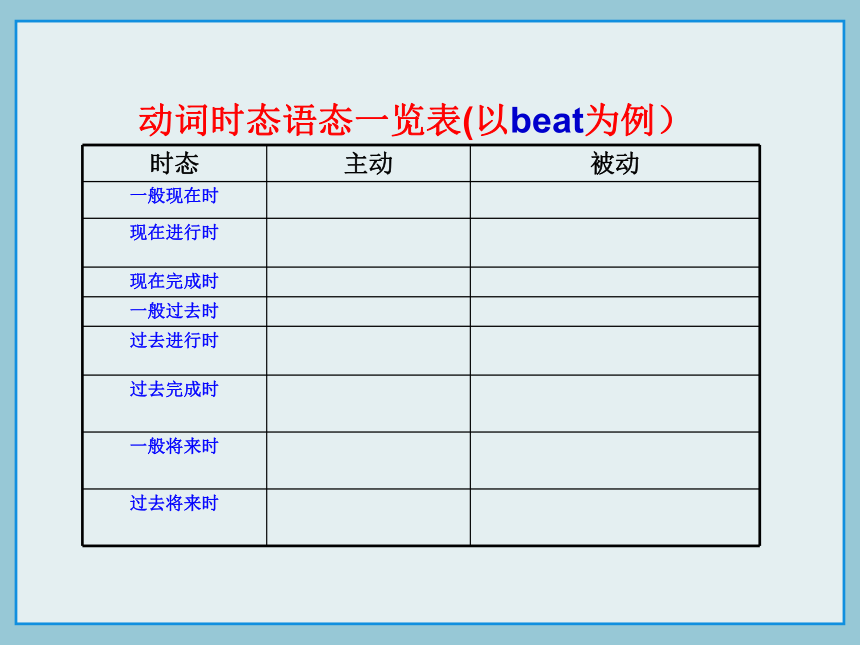


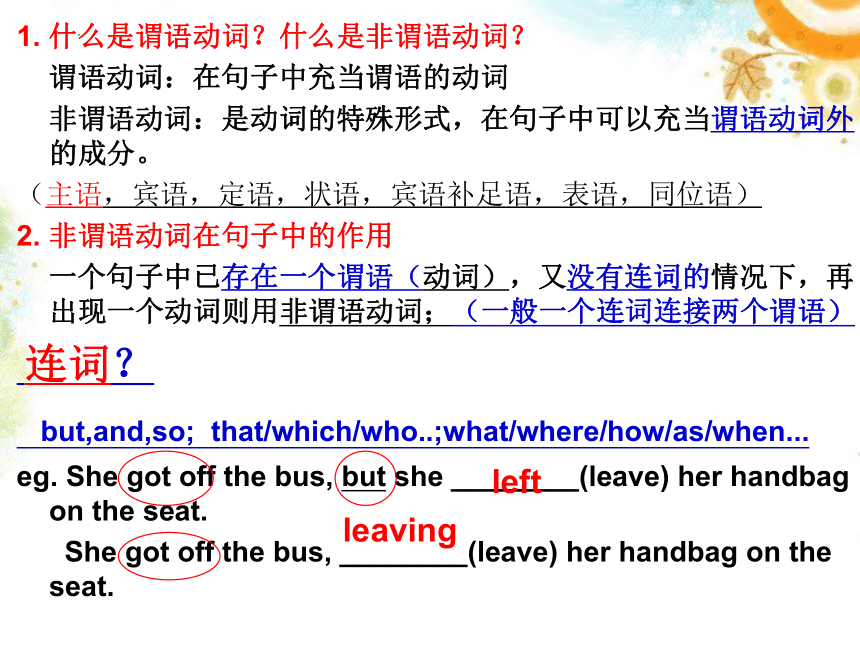
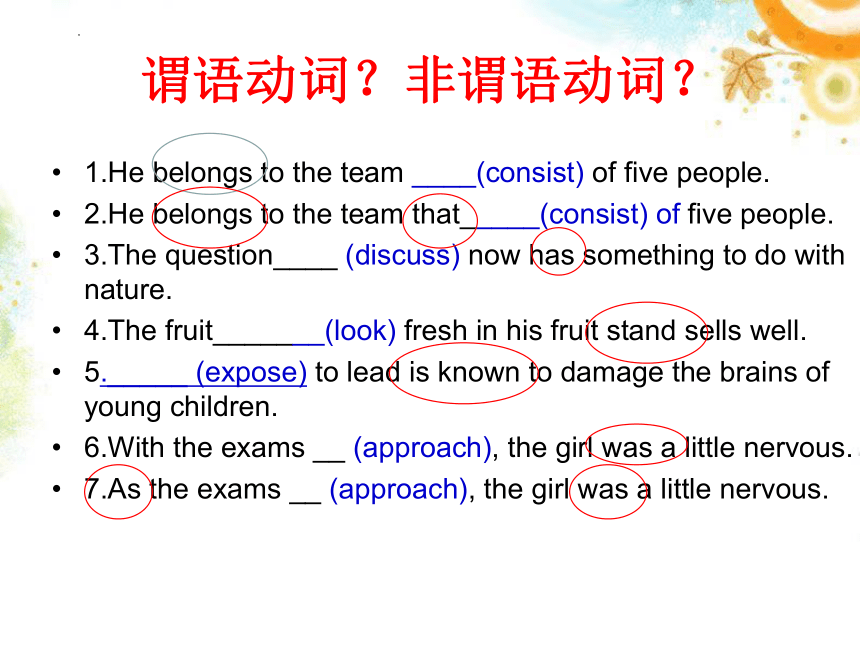

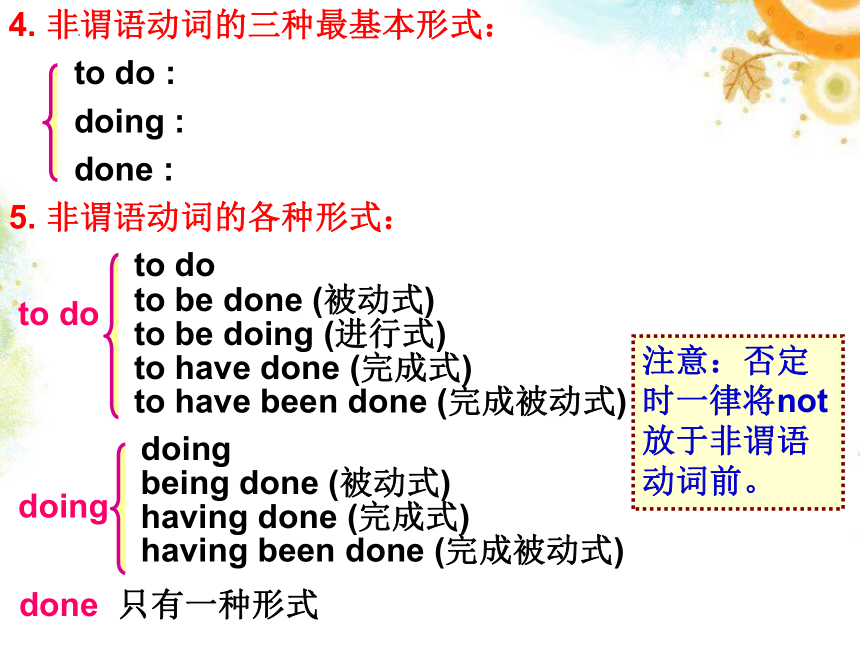
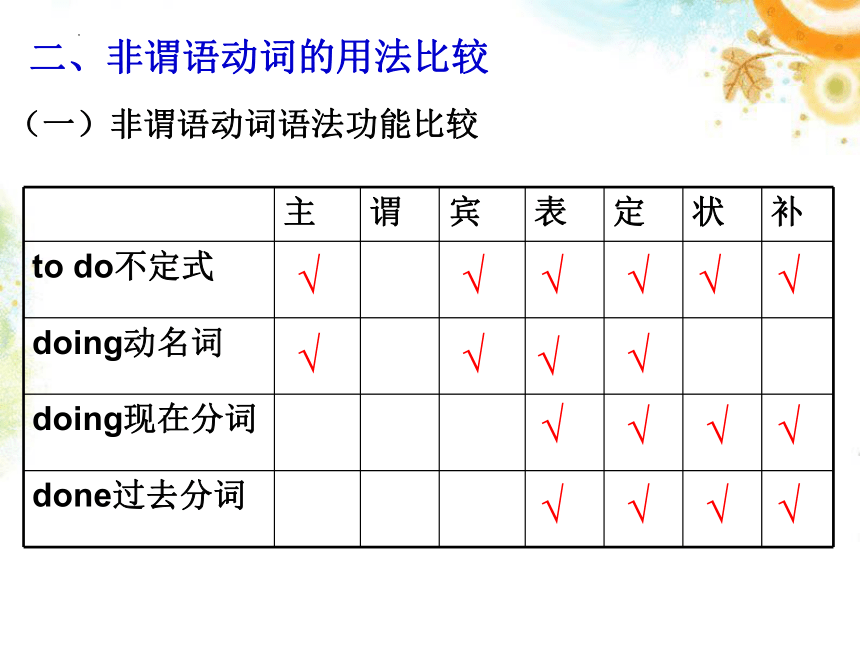
文档简介
(共27张PPT)
2024届高三
时态语态复习
2024届高三一轮复习
非谓语动词
Non-finite verbs
动词时态语态一览表(以beat为例)
时态 主动 被动
一般现在时
现在进行时
现在完成时
一般过去时
过去进行时
过去完成时
一般将来时
过去将来时
动词时态语态一览表(以beat为例)
时态 主动 被动
一般现在时 beat/beats am/is/are beaten
现在进行时 am/is/are beating am/is/are being beaten
现在完成时 have/has beaten have/has been beaten
一般过去时 beat was/were beaten
过去进行时 was/were beating was/were being beaten
过去完成时 had beaten had been beaten
一般将来时 will beat will be beaten
过去将来时 Should/would beat should/would be beaten
Banks actively encourage people to borrow money.
谓语动词
非谓语动词
宾语补足语
1. 什么是谓语动词?什么是非谓语动词?
谓语动词:在句子中充当谓语的动词
非谓语动词:是动词的特殊形式,在句子中可以充当谓语动词外的成分。
(主语,宾语,定语,状语,宾语补足语,表语,同位语)
2. 非谓语动词在句子中的作用
一个句子中已存在一个谓语(动词),又没有连词的情况下,再出现一个动词则用非谓语动词;(一般一个连词连接两个谓语)
连词?
but,and,so; that/which/who..;what/where/how/as/when...
eg. She got off the bus, but she ________(leave) her handbag on the seat.
She got off the bus, ________(leave) her handbag on the seat.
left
leaving
谓语动词?非谓语动词?
1.He belongs to the team ____(consist) of five people.
2.He belongs to the team that_____(consist) of five people.
3.The question____ (discuss) now has something to do with nature.
4.The fruit_______(look) fresh in his fruit stand sells well.
5._____ (expose) to lead is known to damage the brains of young children.
6.With the exams __ (approach), the girl was a little nervous.
7.As the exams __ (approach), the girl was a little nervous.
3.When ________(surf) the Internet, I downloaded the film.
3. 什么情况下使用非谓语?
一个句子中已存在一个谓语(动词),又没有连词的情况下,再出现一个动词则用非谓语动词。
4. 非谓语动词的三种最基本形式:
to do :
定语表将来;状语表目的、结果
doing :
主动、进行
done
:被动、完成
4. 非谓语动词的三种最基本形式:
to do :
doing :
done :
5. 非谓语动词的各种形式:
to do
doing
to do
to be done (被动式)
to be doing (进行式)
to have done (完成式)
to have been done (完成被动式)
doing
being done (被动式)
having done (完成式)
having been done (完成被动式)
done 只有一种形式
注意:否定时一律将not放于非谓语动词前。
二、非谓语动词的用法比较
(一)非谓语动词语法功能比较
主 谓 宾 表 定 状 补
to do不定式
doing动名词
doing现在分词
done过去分词
√
√
√
√
√
√
√
√
√
√
√
√
√
√
√
√
√
√
非谓语动词:
解题步骤:
1.判断非谓语动词在句子中所作的成分(主语、宾语、表语、定语、状语、补足语)。
2.找非谓语动词的逻辑主语,判断主动、被动。
3.根据关键词或者句意,判断非谓语动词是已经完成还是正在进行还是将要发生的动作。
4、注意固定搭配。
哪些动词只能加doing做宾语?
哪些动词只能加to do做宾语?
哪些固定句型?
(二)不定式(to do)与动名词(doing)作主语的区别
1. to do表某一具体动作,doing表习惯动作或抽象概念。
eg. ___________ (swim) is a good form of exercise.
_________ (swim) this afternoon sounds good.
_____________ to strong sunlight too much is harmful.
2. 都可以用it作形式主语构成相应句型。
不定式用it作形式主语:
It is adj./n.(for/of sb.) to do sth.
动名词用it作形式主语:
It is no use/good doing sth.
It is a waste of time doing sth.
其他需做区分的句型:
There’s no sense/point (in) doing sth.
There’s no denying that…
There’s no need (for sb.) to do sth.
Swimming
To swim
Being exposed
(三)不定式(to do) 与动名词(doing)作宾语的区别
1. 绝大多数动词后跟不定式(to do)做宾语
如:decide, determine, want, expect,wish, hope, agree, refuse,manage, offer, pretend, promise等。
2. 只跟动名词(doing)作宾语的动词:
avoid, admit, advise, allow, appreciate, consider(考虑),dislike, delay, deny,enjoy,escape, excuse, forbid(禁止), finish, keep, imagine, mind, miss(错过),mention, practise, postpone(推迟), permit,quit, risk, resist(抵制), recommend,suggest, stand(bear,tolerate), understand.
注意:1) allow/permit/advise/recommend doing,
allow/permit/advise/recommend sb. to do
2) forbid doing
但forbid sb. to do或forbid sb. from doing
3. 可跟不定式(to do)也可跟动名词(doing)作宾语的动词
1)意义有区别:
mean try stop go on
remember forget can’t help
regret as if only
注意:as if和only并非动词,但在这里一起进行了归纳。
2)意义无区别:
continue to do/doing start to do/doing begin to do/doing
to do
doing
to do
doing
to do
doing
to do
doing
to do
doing
to do
doing
to do
doing
to do
doing
to do
doing
to do
doing
4. 不定式(to do)作宾语后有补语时,常用it作形式宾语。
常见结构:
think/believe/consider/find/feel/ + it + adj./n. + to do
eg. 我认为有必要向老师求助。
I think it necessary to ask the teacher for help.
我觉得帮助别人是我的职责。
I feel it my duty to help others.
(四)非谓语动词作表语的区别
1. 不定式(to do)作表语表未发生的具体动作
eg. 我的目标是去北京大学学习。
我们应该做的就是好好学习。
注意:不定式作表语时前面有实意动词do(做)及其相关变 形,不定式可省略符号to。
2. 动名词(doing)作表语表习惯动作或抽象概念。
eg. 我的兴趣爱好是读书。
3. 现在分词(doing)作表语表令人……..的。
eg. 这则消息令人吃惊。
4. 过去分词(done)做表语表感到………的。
eg. 我们对这则消息感到吃惊。
My purpose/aim/goal is to study in Peking University.
What we should do is (to) work hard.
My hobby is reading books.
The news is surprising.
We are surprised at the news.
encouraging encouraged
pleasing pleased
puzzling puzzled
satisfying satisfied
surprising surprised worrying worried
embarrassing embarrassed
inspiring inspired
interesting interested
The boy looked up with a_______ expression .
pleased
(五)非谓语动词作定语的区别(to do / to be done / doing /being done / done)
不定式(to do):(16-17题)
①表将来 much work to do / a meeting to be built tomorrow
②前面使抽象名词 the chance / ability to do..
③名词前有序数词、the last、the only、the next等修饰时用不定式作定语
eg. He is always the first to come and the last to go.
I want a house to live in.
2. 动名词(doing):表功能
eg. living room, sleeping bag, swimming pool
3. 现在分词(doing):表主动、进行
eg. sleeping baby, a girl lying there , a bike being repaired now
注意:having done和having been done不作定语,一般作状语
4. 过去分词(done):表被动、完成
eg. a retired worker, a killed dog, an excited voice
比较: a bridge built last year / a bridge being built now
a bridge to be built next year
5. 现在分词(doing)与过去分词(done)作定语的区别:
developing country
developed country
falling leaves
fallen leaves
boiling water
boiled water
the changing world
the changed world
(六)不定式(to do),现在分词(doing),过去分词(done)作状语的区别
1)不定式(to do):①表目的 ②意料外的不好结果(only to do 、never to do)
eg. 他匆匆忙忙赶到火车站却发现火车已经开了。
他离开了家乡,再也没有回去。
2)现在分词(doing):①表主动、进行 ②(only/thus)doing可作结果状语表自然结果。现在分词的完成式having done和having been done表示动作先于谓语动词发生。③unless / if / once / when / while+ doing
eg. He goes back home very late every evening, making his wife angry.
Having finished my homework, I played computer games.
He hurried to the station, only to find that the train had gone.
He left his hometown, never to return.
3)过去分词(done):表被动、完成--- having been done
eg. Praised by the teacher, he looks very excited.
注意:分词做状语时,其逻辑主语须和句子的主语一致。
① Doing/Done/Having done/ Having been done, sb….
② Sb…, doing/done/having done / having been done.
_______ (see) from the top of the building, our school looks beautiful.
_________________ (show) around the lab, we went to the computer room.
Unless __________(invite), I won't attend the meeting.
Seen
Having been shown
invited
带有be动词的短语的非谓语形式:去掉be动词
但注意:作主语时要把be变成being
常见带有be动词的短语: be seated (=sitting)坐, be born出生, be absorbed in专心于, be lost in专心于, be tired of对…感到厌倦,be bored with对…感到厌倦,be satisfied with对…感到满意,be determined to do下定决心做, be devoted to doing献身于/致力于,be committed to doing致力于,be faced with面对/面临,be dressed in穿着,be concerned about关心/担心,be disappointed at对…失望, be separated from与…分开/隔开
be exposed to / be convinced of
eg. ________ (devote) himself to his work, he paid little attention to his health.
__________ (devote) to his work, he paid little attention to his health.
___________(生病了), he didn’t attend school.
I returned home, _________________(又累又饿).
Devoting
Devoted
Being ill
tired and hungry
非谓语动词表示说话人态度、观点的短语(句首)
to tell the truth说实话
to be honest / frank 老实说 / 坦白说
to make things worse更糟的是
considering / seeing / given (that) 考虑到,鉴于
judging from/by 从……来判断
generally/strictly/honestly speaking 一般说来 / 严格说来 / 老实说
suppose / supposing / providing / provided (that) 假设/assuming / imagining
独立主格结构
(五)独立主格结构(非谓语有自己的主语)
eg. Weather ________ (permit), we’ll go to visit the Great Wall.
It ______ (be) Sunday, the library doesn’t open.
New words _________ (explain), the text became easier to learn.
So many children _________ (look) after, the mother has to quit her job.
No one _________ (wake) me up, I might be late for the first class.
permitting
being
explained
to look
to wake
(七)不定式(to do)、现在分词(doing)、过去分词(done)作宾补的区别
1. with sb./sth.
注意:without用法同with,只是意思相反
2. find sb./sth.
3. leave sb./sth.
adj. / adv. / prep.
doing
done
to do
adj./adv.
prep.
doing/done
(sitting/seated/seating oneself)
adj./adv.
prep.
doing/done(往往是undone)
to do
4. see sb./sth.
5. get sb.
get sth.
get sth.
6. make sb.
make sth.
do
doing
done
(类似的四看二听一感觉)see, observe, watch, notice, listen to, hear, feel
sb./sth. be seen to do
to do
done
= make/let/have sb. do
= have sth. done
do
= let/have sb. do
sb. be made to do
done
doing
7. have sb.
have sb.
have sth. done
8. keep sb.
keep sb. done
9. catch sb.
do
= let/make sb. do
doing
= keep sb. doing
= get sth. done
doing
= have sb. doing
doing
2024届高三
时态语态复习
2024届高三一轮复习
非谓语动词
Non-finite verbs
动词时态语态一览表(以beat为例)
时态 主动 被动
一般现在时
现在进行时
现在完成时
一般过去时
过去进行时
过去完成时
一般将来时
过去将来时
动词时态语态一览表(以beat为例)
时态 主动 被动
一般现在时 beat/beats am/is/are beaten
现在进行时 am/is/are beating am/is/are being beaten
现在完成时 have/has beaten have/has been beaten
一般过去时 beat was/were beaten
过去进行时 was/were beating was/were being beaten
过去完成时 had beaten had been beaten
一般将来时 will beat will be beaten
过去将来时 Should/would beat should/would be beaten
Banks actively encourage people to borrow money.
谓语动词
非谓语动词
宾语补足语
1. 什么是谓语动词?什么是非谓语动词?
谓语动词:在句子中充当谓语的动词
非谓语动词:是动词的特殊形式,在句子中可以充当谓语动词外的成分。
(主语,宾语,定语,状语,宾语补足语,表语,同位语)
2. 非谓语动词在句子中的作用
一个句子中已存在一个谓语(动词),又没有连词的情况下,再出现一个动词则用非谓语动词;(一般一个连词连接两个谓语)
连词?
but,and,so; that/which/who..;what/where/how/as/when...
eg. She got off the bus, but she ________(leave) her handbag on the seat.
She got off the bus, ________(leave) her handbag on the seat.
left
leaving
谓语动词?非谓语动词?
1.He belongs to the team ____(consist) of five people.
2.He belongs to the team that_____(consist) of five people.
3.The question____ (discuss) now has something to do with nature.
4.The fruit_______(look) fresh in his fruit stand sells well.
5._____ (expose) to lead is known to damage the brains of young children.
6.With the exams __ (approach), the girl was a little nervous.
7.As the exams __ (approach), the girl was a little nervous.
3.When ________(surf) the Internet, I downloaded the film.
3. 什么情况下使用非谓语?
一个句子中已存在一个谓语(动词),又没有连词的情况下,再出现一个动词则用非谓语动词。
4. 非谓语动词的三种最基本形式:
to do :
定语表将来;状语表目的、结果
doing :
主动、进行
done
:被动、完成
4. 非谓语动词的三种最基本形式:
to do :
doing :
done :
5. 非谓语动词的各种形式:
to do
doing
to do
to be done (被动式)
to be doing (进行式)
to have done (完成式)
to have been done (完成被动式)
doing
being done (被动式)
having done (完成式)
having been done (完成被动式)
done 只有一种形式
注意:否定时一律将not放于非谓语动词前。
二、非谓语动词的用法比较
(一)非谓语动词语法功能比较
主 谓 宾 表 定 状 补
to do不定式
doing动名词
doing现在分词
done过去分词
√
√
√
√
√
√
√
√
√
√
√
√
√
√
√
√
√
√
非谓语动词:
解题步骤:
1.判断非谓语动词在句子中所作的成分(主语、宾语、表语、定语、状语、补足语)。
2.找非谓语动词的逻辑主语,判断主动、被动。
3.根据关键词或者句意,判断非谓语动词是已经完成还是正在进行还是将要发生的动作。
4、注意固定搭配。
哪些动词只能加doing做宾语?
哪些动词只能加to do做宾语?
哪些固定句型?
(二)不定式(to do)与动名词(doing)作主语的区别
1. to do表某一具体动作,doing表习惯动作或抽象概念。
eg. ___________ (swim) is a good form of exercise.
_________ (swim) this afternoon sounds good.
_____________ to strong sunlight too much is harmful.
2. 都可以用it作形式主语构成相应句型。
不定式用it作形式主语:
It is adj./n.(for/of sb.) to do sth.
动名词用it作形式主语:
It is no use/good doing sth.
It is a waste of time doing sth.
其他需做区分的句型:
There’s no sense/point (in) doing sth.
There’s no denying that…
There’s no need (for sb.) to do sth.
Swimming
To swim
Being exposed
(三)不定式(to do) 与动名词(doing)作宾语的区别
1. 绝大多数动词后跟不定式(to do)做宾语
如:decide, determine, want, expect,wish, hope, agree, refuse,manage, offer, pretend, promise等。
2. 只跟动名词(doing)作宾语的动词:
avoid, admit, advise, allow, appreciate, consider(考虑),dislike, delay, deny,enjoy,escape, excuse, forbid(禁止), finish, keep, imagine, mind, miss(错过),mention, practise, postpone(推迟), permit,quit, risk, resist(抵制), recommend,suggest, stand(bear,tolerate), understand.
注意:1) allow/permit/advise/recommend doing,
allow/permit/advise/recommend sb. to do
2) forbid doing
但forbid sb. to do或forbid sb. from doing
3. 可跟不定式(to do)也可跟动名词(doing)作宾语的动词
1)意义有区别:
mean try stop go on
remember forget can’t help
regret as if only
注意:as if和only并非动词,但在这里一起进行了归纳。
2)意义无区别:
continue to do/doing start to do/doing begin to do/doing
to do
doing
to do
doing
to do
doing
to do
doing
to do
doing
to do
doing
to do
doing
to do
doing
to do
doing
to do
doing
4. 不定式(to do)作宾语后有补语时,常用it作形式宾语。
常见结构:
think/believe/consider/find/feel/ + it + adj./n. + to do
eg. 我认为有必要向老师求助。
I think it necessary to ask the teacher for help.
我觉得帮助别人是我的职责。
I feel it my duty to help others.
(四)非谓语动词作表语的区别
1. 不定式(to do)作表语表未发生的具体动作
eg. 我的目标是去北京大学学习。
我们应该做的就是好好学习。
注意:不定式作表语时前面有实意动词do(做)及其相关变 形,不定式可省略符号to。
2. 动名词(doing)作表语表习惯动作或抽象概念。
eg. 我的兴趣爱好是读书。
3. 现在分词(doing)作表语表令人……..的。
eg. 这则消息令人吃惊。
4. 过去分词(done)做表语表感到………的。
eg. 我们对这则消息感到吃惊。
My purpose/aim/goal is to study in Peking University.
What we should do is (to) work hard.
My hobby is reading books.
The news is surprising.
We are surprised at the news.
encouraging encouraged
pleasing pleased
puzzling puzzled
satisfying satisfied
surprising surprised worrying worried
embarrassing embarrassed
inspiring inspired
interesting interested
The boy looked up with a_______ expression .
pleased
(五)非谓语动词作定语的区别(to do / to be done / doing /being done / done)
不定式(to do):(16-17题)
①表将来 much work to do / a meeting to be built tomorrow
②前面使抽象名词 the chance / ability to do..
③名词前有序数词、the last、the only、the next等修饰时用不定式作定语
eg. He is always the first to come and the last to go.
I want a house to live in.
2. 动名词(doing):表功能
eg. living room, sleeping bag, swimming pool
3. 现在分词(doing):表主动、进行
eg. sleeping baby, a girl lying there , a bike being repaired now
注意:having done和having been done不作定语,一般作状语
4. 过去分词(done):表被动、完成
eg. a retired worker, a killed dog, an excited voice
比较: a bridge built last year / a bridge being built now
a bridge to be built next year
5. 现在分词(doing)与过去分词(done)作定语的区别:
developing country
developed country
falling leaves
fallen leaves
boiling water
boiled water
the changing world
the changed world
(六)不定式(to do),现在分词(doing),过去分词(done)作状语的区别
1)不定式(to do):①表目的 ②意料外的不好结果(only to do 、never to do)
eg. 他匆匆忙忙赶到火车站却发现火车已经开了。
他离开了家乡,再也没有回去。
2)现在分词(doing):①表主动、进行 ②(only/thus)doing可作结果状语表自然结果。现在分词的完成式having done和having been done表示动作先于谓语动词发生。③unless / if / once / when / while+ doing
eg. He goes back home very late every evening, making his wife angry.
Having finished my homework, I played computer games.
He hurried to the station, only to find that the train had gone.
He left his hometown, never to return.
3)过去分词(done):表被动、完成--- having been done
eg. Praised by the teacher, he looks very excited.
注意:分词做状语时,其逻辑主语须和句子的主语一致。
① Doing/Done/Having done/ Having been done, sb….
② Sb…, doing/done/having done / having been done.
_______ (see) from the top of the building, our school looks beautiful.
_________________ (show) around the lab, we went to the computer room.
Unless __________(invite), I won't attend the meeting.
Seen
Having been shown
invited
带有be动词的短语的非谓语形式:去掉be动词
但注意:作主语时要把be变成being
常见带有be动词的短语: be seated (=sitting)坐, be born出生, be absorbed in专心于, be lost in专心于, be tired of对…感到厌倦,be bored with对…感到厌倦,be satisfied with对…感到满意,be determined to do下定决心做, be devoted to doing献身于/致力于,be committed to doing致力于,be faced with面对/面临,be dressed in穿着,be concerned about关心/担心,be disappointed at对…失望, be separated from与…分开/隔开
be exposed to / be convinced of
eg. ________ (devote) himself to his work, he paid little attention to his health.
__________ (devote) to his work, he paid little attention to his health.
___________(生病了), he didn’t attend school.
I returned home, _________________(又累又饿).
Devoting
Devoted
Being ill
tired and hungry
非谓语动词表示说话人态度、观点的短语(句首)
to tell the truth说实话
to be honest / frank 老实说 / 坦白说
to make things worse更糟的是
considering / seeing / given (that) 考虑到,鉴于
judging from/by 从……来判断
generally/strictly/honestly speaking 一般说来 / 严格说来 / 老实说
suppose / supposing / providing / provided (that) 假设/assuming / imagining
独立主格结构
(五)独立主格结构(非谓语有自己的主语)
eg. Weather ________ (permit), we’ll go to visit the Great Wall.
It ______ (be) Sunday, the library doesn’t open.
New words _________ (explain), the text became easier to learn.
So many children _________ (look) after, the mother has to quit her job.
No one _________ (wake) me up, I might be late for the first class.
permitting
being
explained
to look
to wake
(七)不定式(to do)、现在分词(doing)、过去分词(done)作宾补的区别
1. with sb./sth.
注意:without用法同with,只是意思相反
2. find sb./sth.
3. leave sb./sth.
adj. / adv. / prep.
doing
done
to do
adj./adv.
prep.
doing/done
(sitting/seated/seating oneself)
adj./adv.
prep.
doing/done(往往是undone)
to do
4. see sb./sth.
5. get sb.
get sth.
get sth.
6. make sb.
make sth.
do
doing
done
(类似的四看二听一感觉)see, observe, watch, notice, listen to, hear, feel
sb./sth. be seen to do
to do
done
= make/let/have sb. do
= have sth. done
do
= let/have sb. do
sb. be made to do
done
doing
7. have sb.
have sb.
have sth. done
8. keep sb.
keep sb. done
9. catch sb.
do
= let/make sb. do
doing
= keep sb. doing
= get sth. done
doing
= have sb. doing
doing
